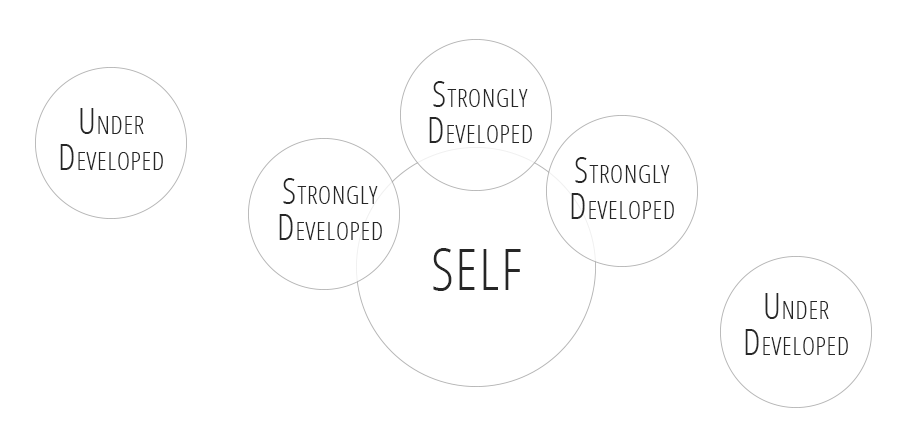When we seek deeper fulfillment in life, wanting answers to is how we can attain more balance and passion, it helps to understand both where we usually put most of our energy & skill what is strongly developed in ourselves and where we are lacking proficiency, motivation or time.
Your Many Selves
I use this visual: the Self is in the circle in the middle, and these large circles immediately surrounding it are those strongly developed selves, areas where we shine. Perhaps you are a man who is confident, efficient and leads others at work. Work is a strongly developed part of yourself. However, this part of you may be overinflated, and to find balance and passion in other areas, you may discover how to spend less time or energy in your work. Perhaps you are also a conscious Parent, involved with your children but not helicoptering over them. Also strongly developed might be your sense of Humor, your fun side, and you rely on laughing things off to stay centered and keep hopeful under duress.
Yet this may get in your way at times, if you laugh off something a friend says in earnest. So it may not serve you well if it is overinflated. In addition, let’s say you are an athlete, caring for your Physical shape and condition through regular exercise and stretching. Your Sexual self is also very important to you, and you seek connection with your partner primarily via touch and mutual pleasure. This can become a challenge if she becomes less sexual during a time in her life. At any rate, these are some of your strongly developed selves, upon which you depend to both be in the world and navigate through it.

There are other sides to you which are underdeveloped, however; you care about them, wish you had more time for them, but they stay out of reach due to lack of time, lost energy at the end of the day, or perhaps you have not begun to realize their value in your life.
Part of developing balance means allowing passion, and passionate responses come alive inside of us when we allow ourselves to have the bigger feelings, such as joy or pain. If you keep yourself “protected,” in the middle or at a 5 on a 1 to 10 continuum, you may feel safer but you won’t feel passionate or balanced. In my framework, balance comes when we allow some of the emotional extremes without reacting to them, and when we nurture spiritual growth at the expense of our own comfort. When you listen to a great song, or poem, it is often about a big feeling — of sadness, joy, or anger. Passion grows greatness.
Growing Spiritually
The benefits to growing spiritually include finding deeper satisfaction & contentment from within, not seeking pleasure primarily through circumstances or other people. A positive result of becoming aware of feelings and knowing we can allow them, and manage them is that we are more “real,” have fewer if any masks we wear, and we “touch down” fully, grounding in this moment, not “hovering” or staying above the surface of real life.
When we begin to develop these underdeveloped selves, we experience a depth from within, new horizons appear, we see things differently, and we can stand in our strength. We begin to allow weakness, not avoid it. It may feel odd, but by being more vulnerable we actually become stronger; similarly, by developing strength, we are able to become more vulnerable. There begins to develop a balance in our very nature, a yin and yang. We also become “more boundaried, and more loving” as Brene’ Brown says, because we know the complexity of who we are and accept a wide range of experiences in ourselves and inside of our hearts, minds and bodies. Then, we can allow others to be who they are, having their own experiences without taking things personally or feeling defensive. There is a flow and a freedom to who we are; we “don’t close,” we “just keep opening” (Michael Singer, The Untethered Soul).
So we look at ourselves to see where we are imbalanced, and we do so with fierce objectivity yet with compassion. Then we make changes. We tweek things, even if it is uncomfortable. We give up time in one area, putting it into another.
“The most fundamental aggression to ourselves, the most fundamental harm we can do to ourselves, is to remain ignorant by not having the courage and the respect to look at ourselves honestly and gently.”
– Pema Chadron, When Things Fall Apart: Heart Advice for Difficult Times
Yet we cannot stop with looking, because just seeing what we do or don’t do is not enough to change it. We must make a commitment to what we want to feel, to the balance we long for, to the passion and exuberance we seek. Then we put the time and energy into those things on a daily and weekly basis.
Reference: C.G. Jung
Pamela W. Brinker, LCSW
Copyright 2016

